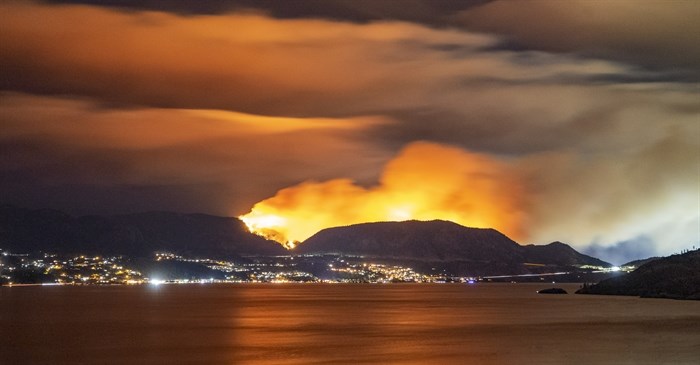
FILE PHOTO - The Mt. Law wildfire, Aug. 15, 2021.
(DAN WALTON / iNFOnews.ca)
September 22, 2021 - 10:49 AM
With the disastrous 2021 wildfire season still fresh in everyone's minds in the B.C. Interior, a study of communications practices at the Wildfire Service suggests changes are needed.
Researchers from Thompson Rivers University produced an 89-page document examining both communication and crisis strategies during the 2017 and 2018 wildfire seasons.
"Risk and crisis communication must be done well, and in a manner that reflects a people-centred approach using local resources, Indigenous knowledge, and evolving best practices,” Dr. Michael Mehta, principal investigator and professor of geography and environmental studies at TRU, said in a press release issued today, Sept. 22.
While the study didn't look at B.C.'s recent wildfire season, Mehta said the fire-ravaged communities of Lytton and Monte Lake faced communication challenges, where residents weren't getting the information they needed to get out.
READ MORE: Logan Lake has written the Fire Smart playbook for other cities, towns to follow
Researchers found that wildfire communication in more remote and Indigenous communities should be improved, and suggested that satellite phones and improved broadband internet connections in those communities would be a valuable tool to send community alerts when most necessary.
They examined the use of social media and acknowledged that while it can sometimes lead to a spread of misinformation, when managed and used effectively, it can communicate both risk and crisis messaging quickly to communities that need to know about immediate wildfire threats.
Researchers also suggested that amateur radio could be a valuable tool for more remote communities. This has also been suggested by amateur radio enthusiasts in Kamloops who say it could be used for emergency broadband networks if wildfires threaten internet lines.
“We hope that this report provides useful information to emergency management organizations across B.C. and elsewhere to reduce the risk from wildfires and other disasters,” Dr. Mehta said.
Researchers also recommended the wildfire service, and other organizations involved in emergency communications, should make distinctions between risk and crisis communications as wildfire season approaches.
READ MORE: From residents to B.C. Wildfire, B.C. continues to innovate on firefighting, detection
It's important, according to the study, to recognize the role of local and Indigenous knowledge before wildfires start, during a crisis and as wildfires become more controlled.
“The BC Wildfire Service is committed to learning and continuous improvement,” Ian Meier, executive director of the BC Wildfire Service, said in the release. “Over the last three years, we’ve made significant investments in research and innovation. We are committed to fostering a learning culture within our organization and it is exciting to begin to see results and recommendations for the future.”
Researchers noted that while the recommendations are not meant to be prescriptive, they should provide guidelines for communications tactics in future wildfire seasons.
A 2018 report by former B.C. cabinet minister George Abbott and hereditary chief Maureen Chapman called for an overhaul of the province's disaster response, including improving communications gaps and relations with First Nations.
Dr. Mehta was aided by three TRU faculty members, including Dr. Wendy Gardner, associate professor of natural resource sciences, Jon Heshka of the adventure studies department and Wendy McKenzie, a nursing school lecturer. Graduate student Merieme Boutaib and undergraduate student Jasper Edge assisted with research.
The full 89-page document can be read here.
READ MORE: Why not just anyone can show up and help fight B.C. wildfires
— With files from The Canadian Press
— This story was corrected at 9:15 a.m. Wednesday, Sept. 29, 2021 to change the name of the community to Monte Lake.
To contact a reporter for this story, email Levi Landry or call 250-819-3723 or email the editor. You can also submit photos, videos or news tips to the newsroom and be entered to win a monthly prize draw.
We welcome your comments and opinions on our stories but play nice. We won't censor or delete comments unless they contain off-topic statements or links, unnecessary vulgarity, false facts, spam or obviously fake profiles. If you have any concerns about what you see in comments, email the editor in the link above.
News from © iNFOnews, 2021